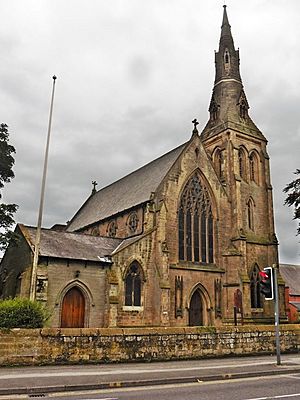Wrexham Cathedral facts for kids
Quick facts for kids Wrexham Cathedral |
|
|---|---|
| Cathedral Church of Our Lady of Sorrows (St Mary's) | |

Exterior
|
|
| Lua error in Module:Location_map at line 416: Malformed coordinates value. | |
| ACoordinates: Unknown argument format |
|
| Location | Wrexham, |
| Country | Wales |
| Denomination | Roman Catholic |
| History | |
| Consecrated | 1857 |
| Architecture | |
| Architect(s) | E. W. Pugin |
| Style | Gothic Revival |
| Years built | 1857 |
| Administration | |
| Diocese | Wrexham (since 1987) |
| Province | Cardiff |
The Cathedral Church of Our Lady of Sorrows, also known as St Mary's Cathedral or Wrexham Cathedral, is a Roman Catholic cathedral in Wrexham, Wales. It is the main church for the Bishop of Wrexham and the most important church in the Roman Catholic Diocese of Wrexham, which was started in 1987.
Contents
A Look Back: How the Cathedral Began
Building a New Church
Wrexham Cathedral started its life as a regular parish church in 1857. A parish church is a local church that serves a specific community. The person who designed this beautiful building was an architect named Edward Welby Pugin.
He chose a style called Decorated Gothic. This style was popular in the 14th century in England. The new church was built because the older chapel on King Street was too small. More and more people were joining the church, and they needed a bigger space. A rich local businessman helped pay for the new building.
Growing Bigger
As the number of church members kept growing, more parts were added to the church in the mid-1900s. These additions included a cloister and a side chapel. A cloister is a covered walkway, often found in churches or monasteries.
In 1898, the church became a pro-cathedral. This means it was a temporary cathedral for the new Roman Catholic Diocese of Menevia. A diocese is an area managed by a bishop. The church was officially blessed and opened as a cathedral on November 7, 1907.
Wrexham Cathedral Today
Today, Wrexham Cathedral is recognized as a Grade II listed building. This means it is a building of special historical or architectural interest. It is protected, so its unique features can be preserved for the future.
See also
 In Spanish: Catedral de Nuestra Señora de los Dolores (Wrexham) para niños
In Spanish: Catedral de Nuestra Señora de los Dolores (Wrexham) para niños
 | Misty Copeland |
 | Raven Wilkinson |
 | Debra Austin |
 | Aesha Ash |

